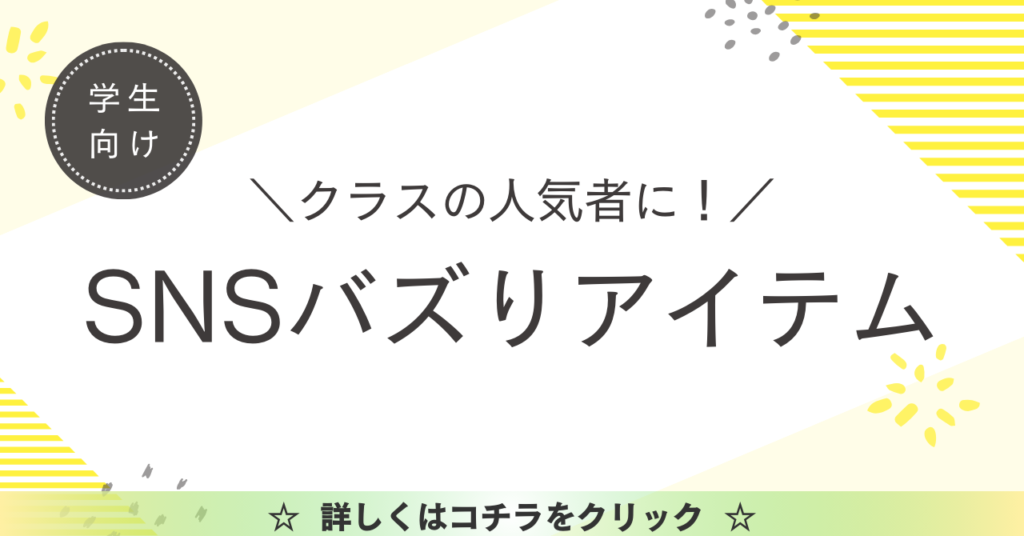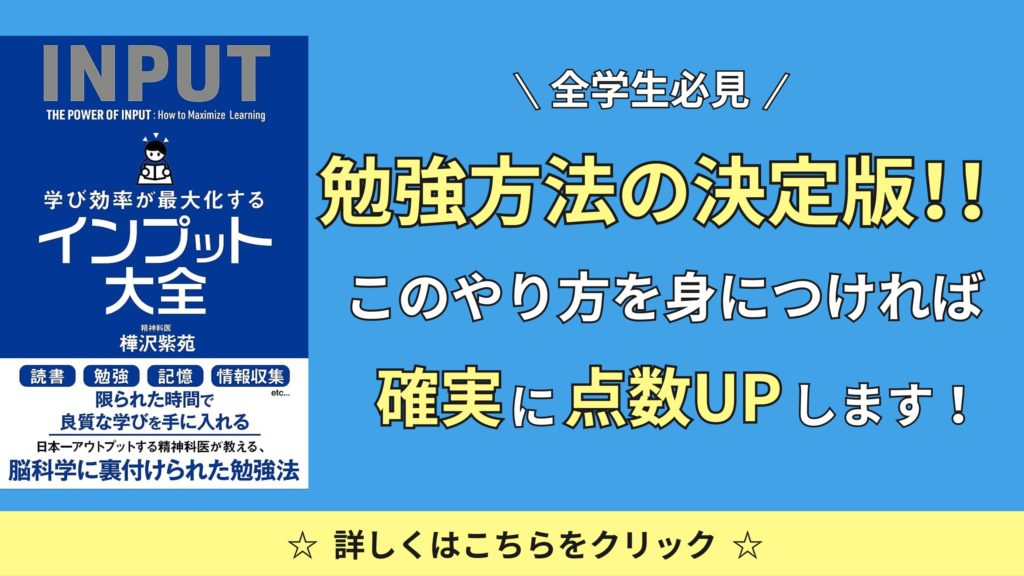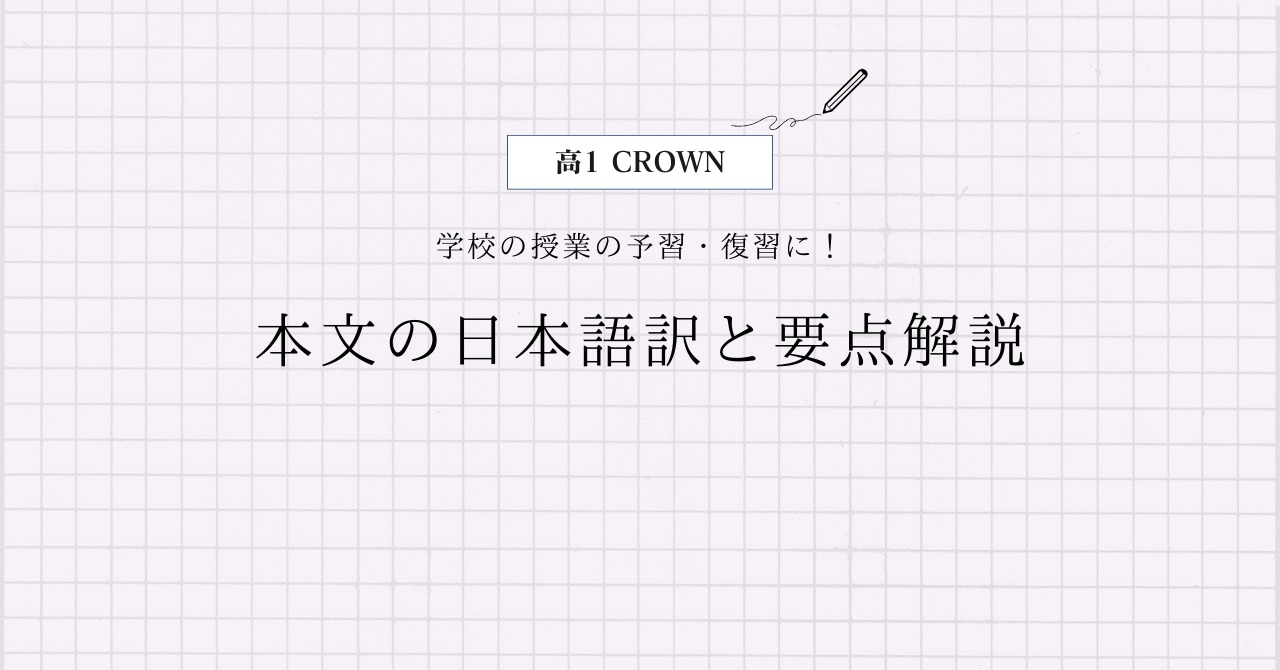三省堂 高1CROWN English Communication1 Lesson6 Section4の本文の日本語訳と重要箇所の解説です。
Section6-1, 6-2, 6-3の解説はこちらからご覧ください。
>高1CROWN English Communication1 Lesson6 Section1 本文和訳
>高1CROWN English Communication1 Lesson6 Section2 本文和訳
>高1CROWN English Communication1 Lesson6 Section3 本文和訳
- CROWN English Communication1 Lesson6 Section4 本文と日本語訳
- CROWN English Communication1 Lesson6 Section4 重要事項の解説
- Smartphones make our lives so easy that we could become mentally lazy.
- We no longer even try to remember meetings and dates.
- We use our smartphones to connect to the Internet.
- We rely on the Internet for the news, for our school reports, and for understanding world events.
- For some of us, the Internet is so easy to use that it has replaced books and newspapers as our main source of information: another form of mental laziness.
- To make matters worse, sometimes the Internet spreads lies.
- We don’t know what to believe and what not to believe.
- Believing everything we see on the Internet is not only lazy, it is also dangerous.
- We must develop the ability to think independently.
- Our smartphones can’t teash us that skill.
- We are living in a new culture where the digital world is meeting the real world.
- And we are only beginning to understand the impact that smartphones have on our mental and social lives.
- Until we come to a better understanding of the impact of these new technologies, maybe we should think about limiting our use of smartphones.
- “Moderation in all things” might not be a bad idea.
- CROWN English Communication1 Lesson6 Section4 まとめ
CROWN English Communication1 Lesson6 Section4 本文と日本語訳
Smartphones make our lives so easy that we could become mentally lazy.
「スマートフォンによって私たちの生活はとても簡単になっているので,私たちは精神的に怠惰になっているかもしれません。」
We no longer even try to remember meetings and dates.
「私たちはもはや会議やデートの日を覚えようとすらしません。」
We use our smartphones to connect to the Internet.
「私たちはスマートフォンをインターネットに接続するために使います。」
We rely on the Internet for the news, for our school reports, and for understanding world events.
「ニュースや学校のレポート,世界の出来事の理解をインターネットに頼っています。」
For some of us, the Internet is so easy to use that it has replaced books and newspapers as our main source of information: another form of mental laziness.
「一部の人々にとっては,インターネットはとても使いやすいので,主要な情報源として本と新聞に取って代わってきています。つまり別の精神的怠惰の形です。」
To make matters worse, sometimes the Internet spreads lies.
「さらに悪いことに,時にインターネットは嘘を広めます。」
We don’t know what to believe and what not to believe.
「私たちは何を信じて,何を信じるべきではないかが分かりません。」
Believing everything we see on the Internet is not only lazy, it is also dangerous.
「私たちがインターネット上で見るすべてのことを信じるのは怠惰なだけではなく,危険でもあります。」
We must develop the ability to think independently.
「私たちは自主的に考える能力をつけなければいけません。」
Our smartphones can’t teash us that skill.
「スマートフォンはその技術を私たちに教えることはできません。」
We are living in a new culture where the digital world is meeting the real world.
「私たちはデジタルの世界が現実世界を満たしている新しい文化の中に暮らしています。」
And we are only beginning to understand the impact that smartphones have on our mental and social lives.
「そして私たちは,スマートフォンが持つ精神生活,社会生活に対しての影響を理解し始めているだけです。」
Until we come to a better understanding of the impact of these new technologies, maybe we should think about limiting our use of smartphones.
「こういった新しい科学技術の影響をよりよく理解するようになるまで,私たちはスマートフォンの使用を制限することについて考えるべきかもしれません。」
“Moderation in all things” might not be a bad idea.
「『何事もほどほどに』というのは悪い考えではないかもしれません。」

CROWN English Communication1 Lesson6 Section4 重要事項の解説
Smartphones make our lives so easy that we could become mentally lazy.
“make”は「使役動詞」で,“make 名詞 動詞の原形”で「名詞に~させる」という重要表現です。
今回のように主語が「もの」のときは,「ものによって~する」といった形で訳すと綺麗な日本語になりやすいですよ。
また,ここでは「so that構文」も使われています。
“could”は本来は助動詞“can”の過去形ですが,「~だろう,かもしれない」という可能性や推量の意味で使うこともあります。今回は“make”も現在形で,文の意味を考えても推量の意味ですね。
“become”は「になる」という動詞で,“mentally”は「精神的に」という副詞,“lazy”は「怠惰な,だらけた」といった形容詞になります。
“lives“は“life(生活,人生)“の複数形で,語尾が”f,fe”で終わる名詞を複数形にするときは”f,fe”を取って”ves”をつけます。
knife→knives(ナイフ), leaf→leaves(葉)などがあります。
We no longer even try to remember meetings and dates.
“no longer~”は「もはや~でない」という重要表現です。“even”は「~でさえ,~すら」といった強調を表す副詞ですね。
“try to 動詞の原形”は「~しようとする」という意味で,これから挑戦するという未来の内容か,挑戦してみたけどダメだったというようなニュアンスで使われることが多いです。難しいといった意味合いが含まれるということですね。
一方で“try 動名詞”は,「(試しに)~してみる」という表現になります。つまりその行為自体はできたという意味合いになります。動名詞の場合は過去の内容になることが多いですね。
“remember”は「を覚えている,思い出す」という動詞で,“meeting”は「会議」,“date”は「デート,日付」という名詞です。
We use our smartphones to connect to the Internet.
“connect”は「繋がる,接続する」という動詞で,“connect to~”で「に接続する」となります。
“to connect”は「不定詞の副詞的用法」になっていますね。
We rely on the Internet for the news, for our school reports, and for understanding world events.
“rely on~”は「に頼る」という重要表現です。
“report”は「レポート,報告」,“event”は「出来事」という名詞です。
“understand”は「を理解する」という動詞で,ここでは「動名詞」になっていますね。
For some of us, the Internet is so easy to use that it has replaced books and newspapers as our main source of information: another form of mental laziness.
“for”は「~にとって」という意味で使われています。今回は「一部の人々にとって」と訳しました。
“of”は前置詞で,”A of B”の形で「BのA」というように後ろから前に訳します。
ここでも「so that構文」が使われていますね。
“it”は“the Internet”を指していて,“replace”は「に取って代わる,を置き換える」という動詞で,ここでは「現在完了」になっています。
“as”は「~として」という前置詞で,“main”は「主な,主要な」という形容詞,“source”は「源,起源」,“information”は「情報」という名詞になります。
最後の「:」は「コロン」と言い,簡単に言うと「つまり」という具合に直前の文章を補足します。コロンを使うときは,コロンの前は必ず文にしないといけない点に注意してください。
“another”は“an + other”が一語になったもので,「もう1つの,もう1人の」という意味の形容詞です。“other”が複数を指すのに対し,”another”は単数を指します。
“form”は「形」,“laziness”は「怠惰,惰性」という名詞で,“mental”は「精神の,心の」という形容詞です。
To make matters worse, sometimes the Internet spreads lies.
“to make matters worse”は「さらに悪いことに」という重要表現です。
“sometimes”は「時々」という頻度を表す副詞で,“spread”は「を広める,広がる」という動詞,“lie”は「嘘」という名詞になります。
We don’t know what to believe and what not to believe.
ここでは「疑問詞+不定詞」が使われていますね。
不定詞の前に”not”を付けると,不定詞の否定形になります。
“believe”は「を信じる」という動詞ですね。
Believing everything we see on the Internet is not only lazy, it is also dangerous.
“believing”は「動名詞」になっていますね。“everything”は「すべてのこと・もの」という名詞です。
また,“we”の前には「目的格の関係代名詞that」が省略されていて,“we see on the Internet”が先行詞“everything”を修飾しています。
先行詞が「all」「anything」「everything」「little」「much」「nothing」の場合は,関係代名詞は”that”を使いますよ!
“not only A but also B”は「AだけでなくBも」という重要表現です。
“it”は“Believing everything we see on the Internet”を指していますね。
We must develop the ability to think independently.
“must”は「~しなければならない」という助動詞ですね。
“develop”は「を発展させる,開発する」といった動詞ですが,今回は「身につける」と訳しました。
“ability”は「能力」という名詞で,“to think”が「不定詞の形容詞的用法」として修飾しています。
“independently”は「自主的に,自立して」という副詞になります。
Our smartphones can’t teash us that skill.
“teach 人 もの”で「人にものを教える」となって,“teach もの to 人”でも同じ意味になります。
他には“show”, “tell”, “give”などが同じ使い方をできるので必ず書き換えられるようにしておきましょう。
“skill”は「技術,スキル」という名詞です。
We are living in a new culture where the digital world is meeting the real world.
ここでは「現在進行形」が2回使われていますね。“culture”は「文化」という名詞です。
“where”は「関係副詞」で,”where the digital world is meeting the real world”が先行詞“a new culture”を修飾しています。
元々は“We are now living in a new culture.”と“The digital world is meeting the real world there.”という2文ということですね。
“digital”は「デジタルの,数字の」,“real”は「現実の,本当の」という形容詞で,“meet”は「を満たす」という動詞です。「会う」以外にも意味があるので覚えておきましょう!
And we are only beginning to understand the impact that smartphones have on our mental and social lives.
ここでも「現在進行形」が使われていますね。
“only”は「~だけ,~しか」といった強調を表す副詞になります。
“begin”は「を始める」という動詞で,“to understand”が「不定詞の名詞的用法」になっています。
“impact”は「影響,衝撃」という名詞で,「目的格の関係代名詞that」を含む“that smartphones have”が先行詞“the impact”を修飾しています。
“social”は「社会の」という形容詞ですね。
Until we come to a better understanding of the impact of these new technologies, maybe we should think about limiting our use of smartphones.
“until”は「~まで」という重要な接続詞です。
“come to 動詞の原形”は「~するようになる」という意味で,“better”は“good”の「比較級」として使われています。
“these”は“this”の複数形で,「これらは(の)」といった意味で,“technology”は「科学技術」という名詞です。
“maybe”は「多分,おそらく」といった意味合いの副詞で,“should”は「~すべきだ,~はずだ」という助動詞ですね。
“limit”は「を制限する」という動詞で,ここでは「動名詞」になっています。“use”は「使用」という名詞になります。
“Moderation in all things” might not be a bad idea.
“moderation”は「節度,適度」という名詞ですが,“Moderation in all things”は「何事もほどほどに」ということわざです。
“might”は「~かもしれない」という助動詞“may”の過去形ですが,今回のように現在形の文でも使うことができます。その場合は“may”よりも可能性の低い推量の意味になります。

CROWN English Communication1 Lesson6 Section4 まとめ
以上がCROWN English Communication1 Lesson6 Section4の日本語訳となります。
「使役動詞」「関係詞」などの使い方をしっかり確認しておきましょう!
>高1CROWN English Communication1 Lesson6 Section1 本文和訳
>高1CROWN English Communication1 Lesson6 Section2 本文和訳
>高1CROWN English Communication1 Lesson6 Section3 本文和訳
何か分からない点や他に解説してほしい点があれば,お気軽にコメントしてください!




コメント